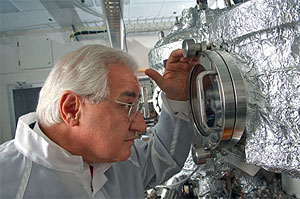Feb 28 2011
A professor at Boston University has secured a DARPA sub contract to design a portable electron-beam pumped semiconductor laser that can be used within the UV region. Professor Theodore Moustakas works in the electrical and computer engineering department of Boston University.
 Professor Theodore Moustakas inspects the growth of semiconductor materials
Professor Theodore Moustakas inspects the growth of semiconductor materials
The handheld laser, with its small size and low emission wavelength, can be manipulated for commercial and defense purposes such as chemical analyses of blood and similar bodily fluids, identification of chemical and biological substances utilized in terror attacks, and non-line-of-sight communication in military theaters through airborne particulates.
Moustakas, along with Roberto Paiella, Associate Professor, and Luca Dal Negro, Assistant Professor, will produce UV laser components and materials to develop the laser technology. The Jet Propulsion Laboratory and Applied Physics Technologies will develop tiny electron guns to drive the laser. Photon Systems will combine the lot into a prototype measuring one cubic inch.
The researchers will use a molecular beam epitaxy, an atom-by-atom assembly method to generate aluminum gallium nitride. The team will then develop component devices from numerous material layers and the materials will be examined in the laboratory by bombarding them with electron beams.
Moustakas informed that by directing an electron beam at the materials results in pairs of holes and electrons that integrate and generate the UV light. The professor is also working on NASA grant to design a similar type of laser for chemical evaluation of soil samples on future Mars missions. Moustakas is also conducting research on air and water sterilization, quantum dots, and UV and visible lasers and LEDs for white lighting.